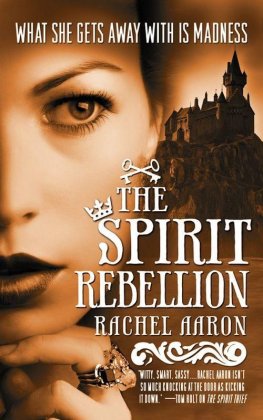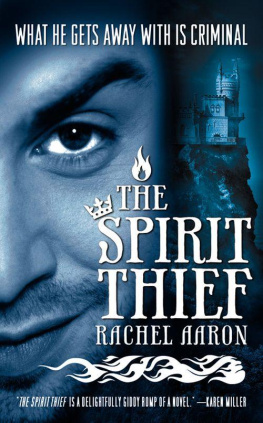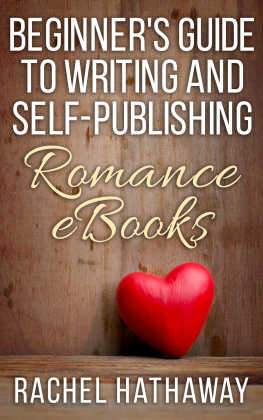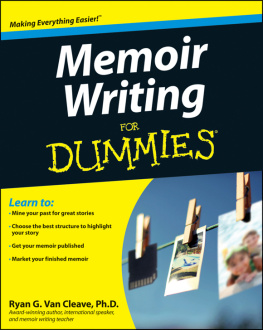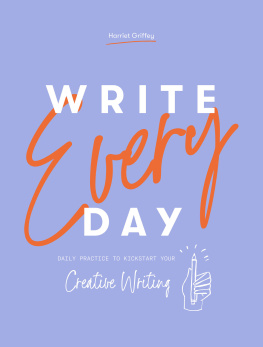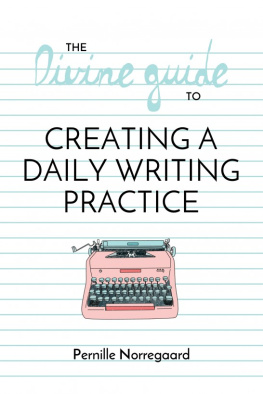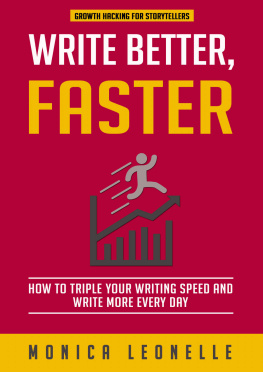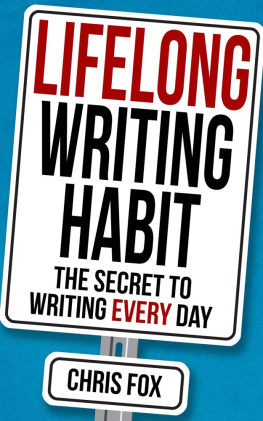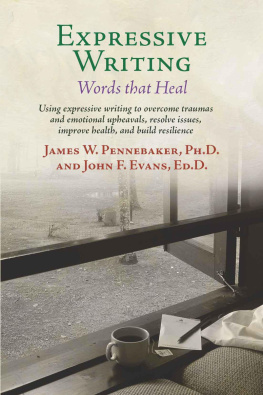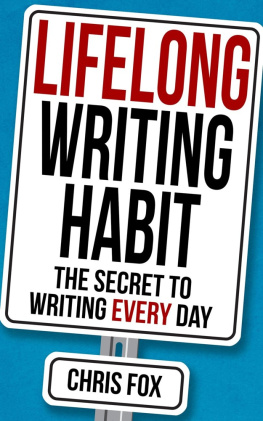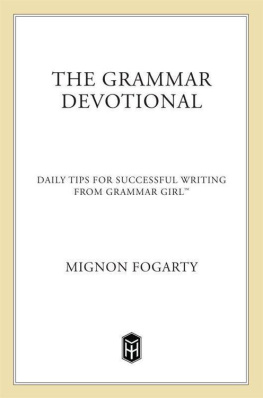Contents
Whats This Book About?
Once upon a time in the long ago summer of 2011, I wrote a blog post called How I Went from Writing 2,000 Words A Day to 10,000 Words a Day cataloging how I went from writing 2000 words during my daily writing sessions to averaging over 10,000 words a day without increasing the hours I spent writing. At the time, I was just excited to share what Id learned about writing more efficiently with others (seriously, I felt like Id discovered the cure to cancer and THE PEOPLE MUST KNOW!). Other than my excitement about sharing something cool, though, I didnt think much would come of it. But the Internet has a funny habit of proving me wrong, and a month after I put the post up, it went viral, spreading to more corners of the web than Id known existed.
By the end of the year, my little how-to writing post had gotten so popular that Im pretty sure more people knew me as that 2k to 10k lady than for my actual published books. And as the post continued to spreadpopping up on the blogs of best selling authors, grad students, writing efficiency experts, and engineers working on cognitive learning AI system (how cool is that?!)so did the requests for more. People from all over the world started writing me and leaving comments, asking questions like: How do you plot your novels? How do you figure out characters? How do you edit?
I answered many of these queries on my blog, but as I started building a body of How I Write posts, I realized that blogging wasnt actually the best medium for what I was trying to do. The multiple posts were confusing for new readers, and since I was answering questions as they came in rather than in logical order, there was no way for someone wanting to actually follow my process to know what came first. If only there was some way to put things in line, I thought to myself. A collection of writing advice arranged so that people who wanted to jump ahead to one part of the process could do so easily while others could start from the beginning. It was around this time that my friend (and hilariously funny writer) John Hartness sent me an e-mail asking why didnt I write a book? And once I finished pounding my head on my desk for not thinking of that myself, I did.
This book, 2k to 10k , is designed to be a practical guide to writing efficiently based on the experience of a working author who doesnt eat if she doesnt produce good novels on a regular basis. The techniques I discuss are not limited to genre fiction: they can and have been used successfully by all sorts of authors writing everything from lyrical prose to technical nonfiction. The goal of this book is not to teach you how to write (there are lots of better books for that by far more venerated authors than myself), but how to get down what youre already writing faster and, hopefully, easier and with better end results.
The chapters that follow are a mix of the above mentioned blog posts (now reworked, updated, and re-edited) as well as several new sections on things like character development and novel structure that I wrote just for this e-book edition. So whether youre looking to speed through your tenth novel or trying to finish your first, I hope my tips and processes will help you reach and exceed your writing goals. Thank you and enjoy!
Rachel Aaron
Disclaimer (or, How To Use This Book for Maximum Efficiency)
This book comes in two parts. The first lays out my actual daily process for achieving enormous word counts with examples while the second outlines how I do all the background work that makes those word counts possible. Both parts are important to how I write quickly, but while I firmly believe the process laid out in How I Went from Writing 2,000 Words a Day to 10,000 Words a Day can help any writer double their daily words whatever their writing style, the methods outlined in part twoplotting, characters, and so forthare more subjective.
I am a plotter, through and through. I thrive on lists, systems, and knowledge, and my methods reflect this. I am also impatient. I hate waiting, wasted time or effort, and Ill admit I have a bit of an obsession with efficiency. But while the systems Ive laid out in part two of this book work amazingly for me, you are not me. You are your own writer, which means only you can understand how to best tell your stories. So, with that in mind, please dont think of anything in this book as gospel. There is no One True Way in writing. Im only telling you what I discovered works for me in the hope that it might also work for you. Never be afraid to kick one of my steps to the curb if it doesnt help your process.
Still with me? Okay! Lets get writing.
Part I
How I Went from Writing 2,000 Words a Day to 10,000 Words a Day
When I started writing The Spirit War ( The Legend of Eli Monpress novel #4), I had a bit of a problem. I had a brand new baby, and my life (like every new mother's life) was constantly on the verge of shambles. I paid for a sitter four times a week so I could get some writing time, and I guarded those hours like a mama bear guards her cubswith ferocity and hiker-mauling violence. To keep my schedule and meet my deadlines, I needed to write 4000 (4k) words during each of these carefully arranged sessions. I thought this would be simple. After all, before I quit my job to write full time, I'd been writing 2k a day in the three hours before work. Surely with 6 hours of baby-free writing time, 4k a day would be nothing....
But (of course), things didn't work out like that. Every writing day, I'd sit down to add 4000 words to my new manuscript. I was determined, I was experienced, I knew my world. There was no reason I couldn't get 4k. But every night when I hauled myself away from the keyboard, my word count had only increased by 2k, the same number of words I'd been getting before I quit my day job.
Needless to say, I felt like a failure. Here I was, a professional novelist with three books about to come out, and I couldn't even beat the writing I'd done before I went pro. At first I made excuses, this novel was the most complicated of all the Eli books I'd written, I was tired because my son thinks four a.m. is an awesome time to play, etc., etc. But the truth was there was no excuse. I had to find a way to jack up my word count, and with months of 2k a day dragging me down, I had to do it fast . So I got scientific. I gathered data and tried experiments and ultimately ended up boosting my word count to heights far beyond what I'd thought was possible without increasing the time I spent writing each day, and all while making my writing better than ever before.
When I told people at ConCarolinas that I'd gone from writing 2k to 10k per day, I got a huge response. Everyone wanted to know how I'd done it, and I finally got so sick of telling the same story over and over again that I decided to write it down. So, once and for all, here's the story of how I went from writing 500 words an hour to over 1500, and (hopefully) how you can, too.
A quick note: There are many fine, successful writers out there who equate writing quickly with being a hack. I firmly disagree. My methods remove the dross, the time spent tooling around lost in your daily writing, not the time spent making plot decisions or word choices. This is not a choice between ruminating on art or churning out novels for gross commercialism (though I happen to like commercial novels). It's about not wasting your time for whatever sort of novels you want to write.
Drastically increasing your words per day is actually pretty easy. All it takes is a shift in perspective and the ability to be honest with yourself (which is the hardest part). Because I'm a giant nerd, I ended up creating a metric, a triangle with three core requirements: Knowledge , Time , and Enthusiasm . Any one of these can noticeably boost your daily output, but all three together can turn you into a word machine.


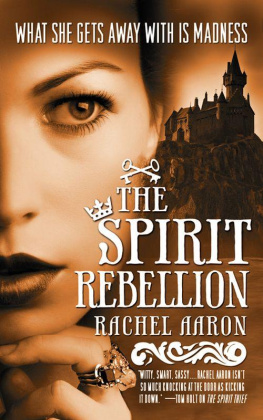
![Rachel Aaron - [Fiction] One Good Dragon Deserves Another](/uploads/posts/book/72324/thumbs/rachel-aaron-fiction-one-good-dragon-deserves.jpg)
